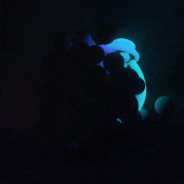QOpenGLFunctions
You use Qt. My example draws a cube. Maybe it will help you. It is Qt 5.15.2
// Add this line to .pro:
// win32: LIBS += -lopengl32
#ifdef _WIN32
#include <windows.h>
extern "C" __declspec(dllexport) DWORD NvOptimusEnablement = 0x00000001;
extern "C" __declspec(dllexport) DWORD AmdPowerXpressRequestHighPerformance = 0x00000001;
#endif
#include <QtWidgets/QApplication>
#include <QtWidgets/QOpenGLWidget>
#include <QtGui/QOpenGLShaderProgram>
#include <QtGui/QOpenGLBuffer>
#include <QtGui/QMatrix4x4>
class OpenGLWidget : public QOpenGLWidget {
Q_OBJECT
public:
OpenGLWidget(QWidget *parent = nullptr)
: QOpenGLWidget(parent)
, m_indexBuffer(QOpenGLBuffer::IndexBuffer)
{
setWindowTitle("Qt C++, OpenGL");
resize(268, 268);
}
private:
QOpenGLShaderProgram m_program;
QOpenGLBuffer m_vertPosBuffer;
QOpenGLBuffer m_normalBuffer;
QOpenGLBuffer m_indexBuffer;
QMatrix4x4 m_projMatrix;
QMatrix4x4 m_viewMatrix;
QMatrix4x4 m_modelMatrix;
int m_amountOfVertices;
void initializeGL() override {
glClearColor(0.5f, 0.8f, 0.7f, 1.f);
glEnable(GL_DEPTH_TEST);
const char *vertShaderSrc =
"#version 330 core\n"
"in vec3 aPosition;"
"in vec4 aNormal;"
"uniform mat4 uMvpMatrix;"
"uniform mat4 uNormalMatrix;"
"out vec4 vColor;"
"void main()"
"{"
" gl_Position = uMvpMatrix * vec4(aPosition, 1.0);"
" vec3 lightDirection = normalize(vec3(0.0, 0.5, 0.7));"
" vec4 color = vec4(1.0, 0.4, 0.0, 1.0);"
" vec3 normal = normalize((uNormalMatrix * aNormal).xyz);"
" float nDotL = max(dot(normal, lightDirection), 0.0);"
" vColor = vec4(color.rgb * nDotL + vec3(0.1), color.a);"
"}";
const char *fragShaderSrc =
"#version 330 core\n"
"in vec4 vColor;"
"out vec4 fragColor;"
"void main()"
"{"
" fragColor = vColor;"
"}";
m_program.addShaderFromSourceCode(QOpenGLShader::Vertex, vertShaderSrc);
m_program.addShaderFromSourceCode(QOpenGLShader::Fragment, fragShaderSrc);
m_program.link();
m_program.bind();
m_amountOfVertices = initVertexBuffers();
m_viewMatrix.lookAt(
QVector3D(20.f, 15.f, 30.f), // eye position
QVector3D(0.f, 0.f, 0.f), // center
QVector3D(0.f, 1.f, 0.f)); // up
m_modelMatrix.translate(QVector3D(0.f, 0.f, 0.f));
m_modelMatrix.rotate(0.f, QVector3D(0.f, 1.f, 0.f));
m_modelMatrix.scale(7.f, 7.f, 7.f);
}
void paintGL() override {
glClear(GL_COLOR_BUFFER_BIT | GL_DEPTH_BUFFER_BIT);
drawBox();
}
void drawBox() {
QMatrix4x4 mvpMatrix = m_projMatrix * m_viewMatrix * m_modelMatrix;
m_program.bind();
m_program.setUniformValue("uMvpMatrix", mvpMatrix);
QMatrix4x4 normalMatrix;
normalMatrix = m_modelMatrix.inverted();
normalMatrix = normalMatrix.transposed();
m_program.setUniformValue("uNormalMatrix", normalMatrix);
glDrawElements(GL_TRIANGLES, m_amountOfVertices, GL_UNSIGNED_INT, nullptr);
}
void resizeGL(int w, int h) override {
glViewport(0, 0, w, h);
m_projMatrix.setToIdentity();
m_projMatrix.perspective(50.f, (float)width()/height(), 0.1f, 100.f);
}
int initVertexBuffers() {
// Create a cube
// v6----- v5
// /| /|
// v1------v0|
// | | | |
// | |v7---|-|v4
// |/ |/
// v2------v3
float vertPositions[] = {
// v0-v1-v2-v3 front
1.f, 1.f, 1.f, -1.f, 1.f, 1.f, -1.f, -1.f, 1.f, 1.f, -1.f, 1.f,
// v0-v3-v4-v5 right
1.f, 1.f, 1.f, 1.f, -1.f, 1.f, 1.f, -1.f, -1.f, 1.f, 1.f, -1.f,
// v0-v5-v6-v1 up
1.f, 1.f, 1.f, 1.f, 1.f, -1.f, -1.f, 1.f, -1.f, -1.f, 1.f, 1.f,
// v1-v6-v7-v2 left
-1.f, 1.f, 1.f, -1.f, 1.f, -1.f, -1.f, -1.f, -1.f, -1.f, -1.f, 1.f,
// v7-v4-v3-v2 down
-1.f, -1.f, -1.f, 1.f, -1.f, -1.f, 1.f, -1.f, 1.f, -1.f, -1.f, 1.f,
// v4-v7-v6-v5 back
1.f, -1.f, -1.f, -1.f, -1.f, -1.f, -1.f, 1.f, -1.f, 1.f, 1.f, -1.f
};
m_vertPosBuffer.create();
m_vertPosBuffer.bind();
m_vertPosBuffer.allocate(vertPositions, sizeof(vertPositions));
m_program.bindAttributeLocation("aPosition", 0);
m_program.setAttributeBuffer(0, GL_FLOAT, 0, 3);
m_program.enableAttributeArray(0);
float normals[] = {
// v0-v1-v2-v3 front
0.f, 0.f, 1.f, 0.f, 0.f, 1.f, 0.f, 0.f, 1.f, 0.f, 0.f, 1.f,
// v0-v3-v4-v5 right
1.f, 0.f, 0.f, 1.f, 0.f, 0.f, 1.f, 0.f, 0.f, 1.f, 0.f, 0.f,
// v0-v5-v6-v1 up
0.f, 1.f, 0.f, 0.f, 1.f, 0.f, 0.f, 1.f, 0.f, 0.f, 1.f, 0.f,
// v1-v6-v7-v2 left
-1.f, 0.f, 0.f, -1.f, 0.f, 0.f, -1.f, 0.f, 0.f, -1.f, 0.f, 0.f,
// v7-v4-v3-v2 down
0.f, -1.f, 0.f, 0.f, -1.f, 0.f, 0.f, -1.f, 0.f, 0.f, -1.f, 0.f,
// v4-v7-v6-v5 back
0.f, 0.f, -1.f, 0.f, 0.f, -1.f, 0.f, 0.f, -1.f, 0.f, 0.f, -1.f
};
m_normalBuffer.create();
m_normalBuffer.bind();
m_normalBuffer.allocate(normals, sizeof(normals));
m_program.bindAttributeLocation("aNormal", 1);
m_program.setAttributeBuffer(1, GL_FLOAT, 0, 3);
m_program.enableAttributeArray(1);
int indices[] = {
0, 1, 2, 0, 2, 3, // front
4, 5, 6, 4, 6, 7, // right
8, 9, 10, 8, 10, 11, // up
12, 13, 14, 12, 14, 15, // left
16, 17, 18, 16, 18, 19, // down
20, 21, 22, 20, 22, 23 // back
};
m_indexBuffer.create();
m_indexBuffer.bind();
m_indexBuffer.allocate(indices, sizeof(indices));
int amountOfVertices = sizeof(indices) / sizeof(indices[0]);
return amountOfVertices;
}
};
#include "main.moc"
int main(int argc, char *argv[]) {
QApplication a(argc, argv);
OpenGLWidget w;
w.show();
return a.exec();
}






